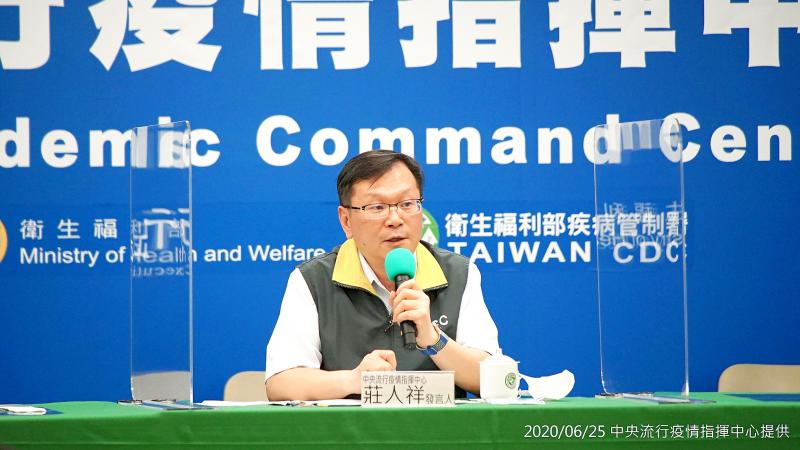The Central Epidemic Command Center (CECC) yesterday reiterated its COVID-19 testing policy amid concerns that not enough was being done after a Japanese student who last week returned home from Taiwan was confirmed to have the disease.
Taiwan on Tuesday received notice from Japanese authorities of a confirmed case of COVID-19, a female student in her 20s who had returned to Japan from Taiwan and was asymptomatic, the CECC said on Wednesday.
The student traveled to Taiwan in late February and had been studying in southern Taiwan, it said.

Photo: Lin Hui-chin, Taipei Times
She returned to Japan on Saturday last week and tested positive upon her arrival there, it said.
Japanese authorities yesterday morning told the center that the woman’s cycle threshold was 37.38, which in Taiwan would be considered a “weak positive,” Centers for Disease Control Deputy Director-General Chuang Jen-hsiang (莊人祥), spokesman for the center, told a news conference in Taipei.
Japanese authorities and the center believe that the case was unlikely to have been contagious at the time of testing, Chuang said.
As the student showed no symptoms, it is difficult to know when she was infected, he said.
The center could not rule out the possibility that the student was infected in Taiwan, he said.
The center’s policy is that if an individual is displaying symptoms and suspected of having the virus by a doctor, they can be tested, he said.
For every confirmed case of COVID-19, the center usually tests an additional 160 to 170 people, he said, adding that this level of testing was deemed to be extra cautious.
The center on Wednesday said that it identified 140 people who had been in contact with the Japanese student, including 125 people who had been placed in home isolation and 15 who have been asked to self-manage their health.
The center yesterday revised the number of people ordered into home isolation to 123.
All 123 had been tested for COVID-19 as of last night, it said.
Negative results for 109 of the 123 had been received as of press time last night.
The results for the remainder would be released today, Chuang said.
Meanwhile, the center reported one new imported case.
The patient — the nation’s 447th case — is a man in his 60s who traveled to Guatemala in early April for business, Chuang said.
On June 1, he developed symptoms including coughing, shortness of breath and aching bones, Chuang said.
The man sought medical advice in Guatemala, but twice tested negative for the novel coronavirus, Chuang said.
On Tuesday, the man’s symptom of breathlessness worsened, Chuang said, adding that upon his arrival in Taiwan on Wednesday, he reported his situation to authorities at the airport and was retested.
He was sent to a quarantine facility and did not come into contact with family members or friends in Taiwan, Chuang said.
Ten passengers sat in the two rows in front of and behind the man and they have been ordered to isolate at home, he said.
Additional reporting by Lin Hui-chin

CHAOS: Iranians took to the streets playing celebratory music after reports of Khamenei’s death on Saturday, while mourners also gathered in Tehran yesterday Iranian Supreme Leader Ayatollah Ali Khamenei was killed in a major attack on Iran launched by Israel and the US, throwing the future of the Islamic republic into doubt and raising the risk of regional instability. Iranian state television and the state-run IRNA news agency announced the 86-year-old’s death early yesterday. US President Donald Trump said it gave Iranians their “greatest chance” to “take back” their country. The announcements came after a joint US and Israeli aerial bombardment that targeted Iranian military and governmental sites. Trump said the “heavy and pinpoint bombing” would continue through the week or as long

TRUST: The KMT said it respected the US’ timing and considerations, and hoped it would continue to honor its commitments to helping Taiwan bolster its defenses and deterrence US President Donald Trump is delaying a multibillion-dollar arms sale to Taiwan to ensure his visit to Beijing is successful, a New York Times report said. The weapons sales package has stalled in the US Department of State, the report said, citing US officials it did not identify. The White House has told agencies not to push forward ahead of Trump’s meeting with Chinese President Xi Jinping (習近平), it said. The two last month held a phone call to discuss trade and geopolitical flashpoints ahead of the summit. Xi raised the Taiwan issue and urged the US to handle arms sales to

A magnitude 5.6 earthquake struck off the coast of Yilan County at 12:37pm today, with clear shaking felt across much of northern Taiwan. There were no immediate reports of damage. The epicenter of the quake was 16.9km east-southeast of Yilan County Hall offshore at a depth of 66.8km, Central Weather Administration (CWA) data showed. The maximum intensity registered at a 4 in Yilan County’s Nanao Township (南澳) on Taiwan’s seven-tier scale. Other parts of Yilan, as well as certain areas of Hualien County, Taipei, New Taipei City, Taoyuan, Hsinchu County, Taichung and Miaoli County, recorded intensities of 3. Residents of Yilan County and Taipei received

Taiwan has secured another breakthrough in fruit exports, with jujubes, dragon fruit and lychees approved for shipment to the EU, the Ministry of Agriculture said yesterday. The Animal and Plant Health Inspection Agency on Thursday received formal notification of the approval from the EU, the ministry said, adding that the decision was expected to expand Taiwanese fruit producers’ access to high-end European markets. Taiwan exported 126 tonnes of lychees last year, valued at US$1.48 million, with Japan accounting for 102 tonnes. Other export destinations included New Zealand, Hong Kong, the US and Australia, ministry data showed. Jujube exports totaled 103 tonnes, valued at